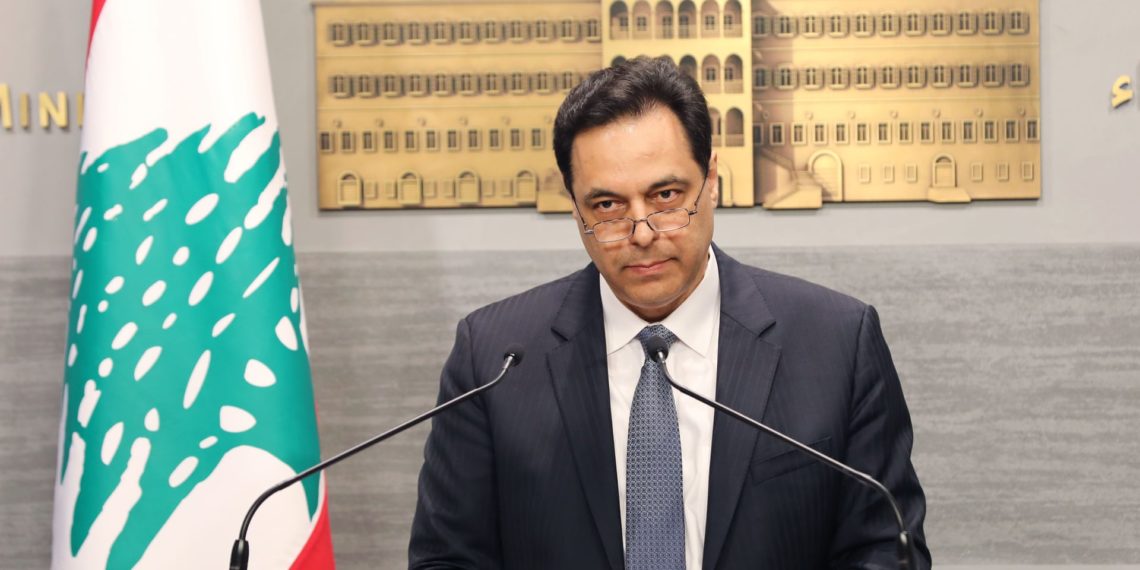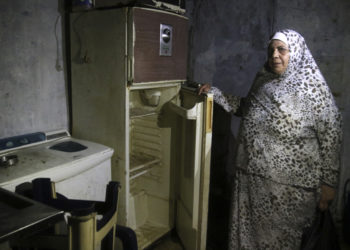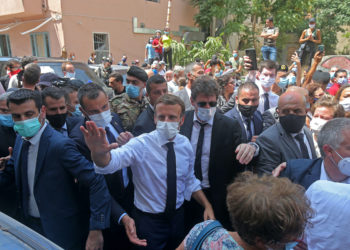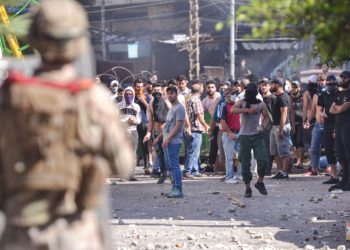Earlier this month, Lebanese Prime Minister Hassan Diab admitted that the state had lost the nation’s confidence and is unable to protect its people. More recently, the government defaulted on its debt amid economic collapse and the devaluation of the country’s currency.
This comes amid ongoing anti-government and anti-sectarian protests. Diab’s assessment for the people’s lost confidence, however, is lacking. He does not engage with larger societal changes making the sectarian system undesirable, namely societal “desectarianization” and widespread frustration with rampant corruption.
When protests broke out in October, many young people in the capital’s Martyrs Square expressed that the demonstrations’ non-sectarian nature gave them the confidence to come to the streets and voice discontent. Sectarian affiliation often facilitates employment and services not offered by the state through politicians’ patronage networks.
This is in addition to the shadow of the 1975-1990 civil war, which had a definite sectarian dimension. The rejection of sectarianism, however, hints at a potential shift in society. The phrase “all of them means all of them” captures this shift, calling out the entire establishment of sectarian elites for putting their personal power and wealth ahead of the nation. No political parties have been spared the wrath of the protesters.
‘Desectarianization’ of Elites
There is a rift between the sectarian elites, who mainly care about maintaining power and access to their patronage networks, and a large segment of the Lebanese population, who wish to be treated as citizens rather than patrons.
A significant portion of Lebanese society is in an ongoing process of “desectarianization” against the sectarian political elites’ desires. This desectarianization affects many parts of society, including the political, economic, and social aspects. This view is based on formal interviews conducted with university students, as well as informal conversations with Lebanese protesters in Beirut.
I defined desectarianization using the term “sectarianization,” or the processes and combination of factors that cause religious or ethnic identities to become politically salient. Therefore, desectarianization de-emphasizes these identities.
In Lebanon, a combination of elite manipulations, geopolitics, armed conflicts, religious differences, clientelism, and other factors contributed to the creation and entrenchment of a sectarian state with strong sectarian divisions within society. Over time, the Lebanese have lost faith in this system that they accuse of facilitating corruption and impeding national unity.
Rejection of Sectarian Labels
For one young woman I interviewed in Beirut, the hardened sectarian divisions do not reflect her daily life. She grew up in a Sunni household, lives with Christians, has Druze cousins, and spends time with friends in cross-sectarian relationships. For her, sectarianism is a concept of the past that should not rule her daily life in the present.
In many cases, young Lebanese men and women told me that they did not know the religious backgrounds of their friends, mainly because they rejected the institutionalized need to know. Sectarian affiliation, in their view, should not be a barrier to various social relationships.

This rejection of sectarian labels is in stark contrast to the functioning of the Lebanese state. Parliamentary seats are divided by sect, and the offices of President, Prime Minister, and Speaker of the Parliament are reserved for a Maronite Catholic, a Sunni Muslim, and a Shi’a Muslim, respectively. While a version of this allotment was in practice before the civil war, it was concretized in the post-war Ta’if Agreement.
Furthermore, laws relating to marriage, inheritance, divorce, and child custody, among others, are administered by the religious courts with no civil alternative. This means that for all functional purposes, Lebanese citizens must have a formal sectarian identity to access their rights.
Lebanon’s Patronage Networks
In more unofficial ways, sectarian elites have worked to ensure their continued access to power through patronage networks. To retain support, politicians often rely on these networks, providing free services that are either lacking or too expensive for the average person, as well as jobs in the public sector as rewards for voting a specific way. Services can include fees associated with healthcare, electricity, and school expenses.
Yet, as this protest movement has shown, a large segment of the population is tired of sectarianized politics and the corruption they associate with it. Former Foreign Minister Gebran Bassil is a key figure linked to many years of corruption, though far from the only figure. As the son-in-law of President Michel Aoun, many view Bassil as the product of nepotism and the one responsible for various problems in the Water and Electricity and Foreign ministries, cabinet positions he has held in recent years.
Desectarianization and Hezbollah
For the sectarian political parties, the desectarianization of Lebanese society could spell disaster. The existential threat is even stronger for Hezbollah, who over time became a defender of the Lebanese state’s status quo, including its corruption, just as the state defends the party and its arms from groups opposed to Hezbollah’s arsenal.
The end to a sectarian form of politics could mean an end to Hezbollah’s symbiotic relationship with the state, as the election of a non-sectarian government would likely result in the dismantlement of the organization’s military wing.
Very touching this.
Christian and Muslim women in #Lebanon marching between Christian and Muslim neighborhoods, which were frontlines during the civil war.
The women shouted slogans against sectarianism.https://t.co/BiIAiYZpjE
— Jenan Moussa (@jenanmoussa) December 1, 2019
Calls for an end to the sectarian system scare the sectarian elite, who fear losing their patronage networks and influence in state institutions, a likely scenario if elections are held early.
As one young woman in Beirut pointed out, “if these [sectarian] institutions were fair, they wouldn’t worry, but because they aren’t fair […] they are worried.” Given the unrelenting nature of the protest movement, it is unclear how the current administration will maintain its power, particularly in the event of elections, whether as scheduled in 2022 or earlier.
In the coming months, the entire Lebanese political establishment will have to regain the trust of the people, a task it is unlikely capable of doing, meaning that there is a stronger potential for a non-sectarian political system to develop.
Disclaimer: The views and opinions expressed here are those of the author and do not necessarily reflect the editorial position of The Globe Post.









![Beyond These Walls: Social Control and Criminal Justice in America [Part I]](https://theglobepost.com/wp-content/uploads/2019/04/US-prison-75x75.jpg)













